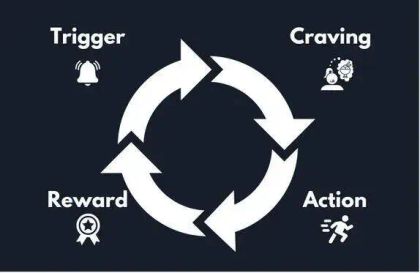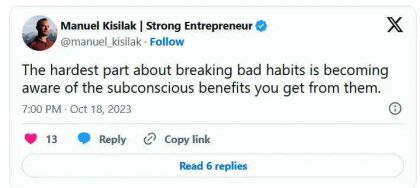The ultimate cure to bad habits (not willpower)
Quitting bad habits is tough.
If you tried it in the past, here's probably what it looked like:
- You realize that you eat too much chocolate
- You feel guilty about what you've done to your body
- You pledge to change and fight the urge to indulge
- You do that for a couple of days, until your willpower erodes
- You're back into your old patterns within a week or two (and feel terrible about yourself)
Quitting a bad habit that way is like Sisyphus pushing a boulder up a mountain: It always comes back crashing down on you, no matter how hard you fight.
But why is that? And - more importantly - what can you do about it?
Here's what I learned after quitting my habits of binge drinking, eating junk food, excessive gaming, doom scrolling, and procrastinating: Quitting bad habits is not just about willpower.
If it was, you'd have already stopped it, as I'm sure you've done things that require much greater willpower (in your professional or personal life) than putting away your phone, a piece of junk food, or cigarette.
Especially since you already know how terrible it is for you.
Truth is, habits go much deeper than pure force. And in this newsletter, we'll dive into it.
If you want to get rid of destructive habits for good - even if you’re tired, exhausted, and out of willpower - so that you can build your dream physique, keep reading.
Are you living on autopilot?
To stop the cycle, you need to understand three crucial things about habits:
1) Habits are subconscious
Scientists at the Max Planck Institute found something incredible: The brain fires in habit areas before we even know it. In other words: Your brain starts habits even before you realize it. To effectively let go of habits, you have to get conscious of this pull, so that you can counteract (I’ll show you how to do that).
2) Habits are survival mechanisms

On average, humans make 35,000 decisions - daily! Too much to handle consciously. To cope, the brain forms habits as shortcuts - not distinguishing between 'good' or 'bad' - to ensure your survival.
That's why fighting bad habits is such a poor strategy: You're fighting one of the brain's survival mechanisms! And you can bet that your brain has all sorts of deceptive strategies, designed to keep those habits it learned.
How does it do that? Let's take a closer look at the anatomy of habits...
3) Habits happen in stages
Most people think of habits only as the action itself:
- You eat the pizza
- You brush your teeth
- You scroll your phone
- You smoke the cigarette
- You hit the “snooze” button
But in reality, that's only one out of four stages of a habit:
Trigger
The trigger is like an alarm clock: It signals to your brain that it's time to engage in the habit.
This could be:
- People
- Specific locations
- A certain time of the day (or week)
- Sounds, like the ringing of an actual alarm clock
- Or other environmental cues
As an example, I only drank alcohol when I was at parties. Being with my friends, at a bar or club, on a Saturday night was my signal to get the booze flowing.
Once that alarm bell rings, your brain moves on to the next step:
Craving
Cravings are (often uncomfortable) feelings that precede the habit. They’re like a black hole, pulling you in.
For example, you might experience stress at work, leading to a heavy feeling in your chest, which urges you to have a cigarette. It’s at this stage where most people give in because not giving in to the urge is so uncomfortable. The urge will go away through step #3…
Action
What you'd normally consider the habit:
- You turn on the TV
- You drink the coffee
- You bite into the chocolate bar
This gives you…
Reward
Every habit has a perceived benefit - even destructive ones: Usually it comes in the form of coping with stress or uncomfortable emotions.
For example, I used to struggle with crazy social anxiety. Binge drinking was my means to cope with that fear and allowed me to feel confident being around other people.
But as you already know, this is far from ideal.
For a habit to form, all of these stages need to happen. That means we have four options to tackle it!
The awareness & attention method
“Believe nothing, observe everything” - Shamanism
Now we're ready to use that knowledge to our advantage.
To effectively break the habit you don’t need more willpower. You need to develop awareness and attention.
Awareness is like a flashlight showing what's in your mind right now: Your thoughts and your feelings.
Attention is like a magnifying glass: What you hold it on gets stronger (especially thoughts and feelings).
We will use them on every step of the habit cycle. So let's dive into how this looks:
1) Trigger awareness
What causes you to engage in that habit?
Pay attention to the cues.
Here are some more personal examples:
- Getting home from university was my cue to jump into video games
- Starting to feel tired at work signals me to scroll on Instagram
- Sitting down to eat triggered me to watch YouTube videos
- Watching TV was my signal to grab junk food
If you manage to get aware of those cues, you’re giving yourself a choice to respond effectively when the next step kicks in:
2) Craving awareness
Here’s where most people fail, because they make one big mistake: They try to fight the craving.
Remember: Your subconscious thinks habits are necessary for survival! If you fight that survival mechanism, all you do is strengthen the urge (until you’re out of willpower).
Instead, build awareness: What does that craving feel like?
For example, I get a sense of excitement in my upper-chest and throat area when I’m about to grab my phone and distract myself from work. Whenever I notice that feeling, I know that my subconscious wants me to engage in that habit. And when I noticed that I have the ability to make another decision: I can move my attention.
Usually, I just acknowledge the feeling, take a deep breath and focus on my vision - and the craving starts to fade.
But what if you don’t manage to do that? Move on to the next kind of awareness:
3) Action awareness
Here's a major problem with destructive habits: We rarely do them consciously, but in a state of distraction - like stuffing down a bag of chips, while sitting in front of the TV.
If you just sat there and ate that bag mindfully, you'd start to feel different about it: You'd notice the grease on your hands, how uncomfortable it feels within your stomach, and how you keep eating, despite already being full. It wouldn't be as pleasurable anymore and you’d start to question your actions.
Furthermore, awareness gives you another chance to shift your attention: Whenever I catch myself hopping on my phone, I’m able to snap myself out quickly, because I realize that I’m just wasting my time.
If all you took away from this newsletter was the tendency to become more mindful with your behaviors, I’d already make a huge difference for you - I promise.
4) Reward awareness
Here's where it gets tricky: You have to build awareness of the reward you get from engaging in the habit.
As a hint, it's often related to stress and avoiding uncomfortable feelings:
- Drinking to cope with social anxiety
- Lighting a cigarette to get a sense of relief
- Scrolling the phone to avoid reaching out to potential clients (and risk rejection)
The catch is that it's not a sustainable solution:
- Drinking destroyed my body and doesn't build social skills
- Smoking creates more stress in the form of health problems
- Not reaching out to potential clients creates anxiety when revenue stops
Your work is to get aware of that. Here are a few questions that will help you:
- What's the benefit you get from engaging in that habit?
- How can you get the benefit in a healthier way?
- What pain can you avoid through that habit?
- What’s the true cost to keep that habit?
- Is it worth it to keep that habit?
You’ll realize that it's less painful to face the discomfort than distracting yourself with your old habit.
Awareness is the remedy
Here’s what this looks like in practice:
Trigger awareness:
- You come home from work
- You notice how stressed you feel
- You remember there’s a bar of chocolate in your closet
Craving awareness:
- You think about eating that chocolate
- You recognize that warm feeling in your chest, thinking about that chocolate
- You notice how the feeling changes if you move your attention to something else
Action awareness:
- You eat the chocolate, but do it consciously
- You observe how the chocolate sticks to your teeth
- You realize how despite being full, you keep on eating
Reward awareness:
- You notice a sense of relief, but also guilt
- You recognize feeling nauseous and sleepy
- When you go to bed, you observe how your gut sticks out
Here’s the beautiful thing about this method: Awareness allows you to shift your attention and disengage from the habit, before you indulge.
Even if you don’t catch yourself and manage to shift your attention, increasing your awareness is enough to stop the habit over time.
Here’s why: The more aware you get, the more you realize how much suffering this habit creates. You’ll start letting go of it naturally - without relying on sheer willpower.
Mistakes to avoid
Here are some mistakes to avoid when using this method:
Judgment
For the longest time, I used to try to “beat” or “shame” myself out of bad habits - it didn’t work. I’d be able to sustain from the habit for a week or two, but ultimately revert back. What it took was having an honest realization of how my habits were destroying my life:
- The amount of time I wasted scrolling through dumb memes and watching Family Guy (time I could have used productively)
- How binge drinking destroyed my ambitions as a Powerlifter, my health and the emotional impact it had on my family
- The sheer stupidity of yelling at my “friends” through Skype when we lost another ranked match in Dota 2 (and keep on going for another 5 hours)
The deeper awareness I’ve built, the harder it got to keep engaging in those habits - until it became impossible. Avoid judging yourself - all it’ll do is erode your self-esteem. Instead, get honest and self-aware.
Confusing awareness for logic
Every smoker knows that cigarettes are terrible for their health. If knowing this was enough to quit, no one would be smoking.
Being aware of the consequences of a habit is not the same as knowing it analytically. Awareness is the skill to observe yourself within the present moment - while engaging in the habit: Your thoughts, feelings, and actions - this is vital, because you have to be able to do it while you’re in the habit cycle.
Giving up too soon
Awareness is like a muscle: It has to be trained. The worst thing you can do to yourself is label yourself as a “hopeless case” because you didn’t succeed so far.
Don’t get discouraged if you don’t manage to shift your attention the first time you try or “fall off track” - if you stick to that method, you will succeed.
At this point, you have a choice: You can either continue doing what you've done so far (and continue getting the same outcomes), or implement the awareness & attention method to get rid of your bad habits once and for all.
This method is only a fraction of my Strong Entrepreneur Framework.
If you're a driven entrepreneur or creator and looking to:
- Manage stress in an efficient manner for better health and productivity
- Drop up to 20lbs in 90 days, without the diet-hamster wheel
- Reach your dream physique in just 2 hours per week
Click HERE for a free 30-minute strategy call where I'll show you exactly how it works.

